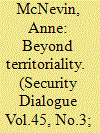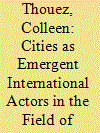|
|
|
Sort Order |
|
|
|
Items / Page
|
|
|
|
|
|
|
| Srl | Item |
| 1 |
ID:
132340


|
|
|
|
|
| Publication |
2014.
|
| Summary/Abstract |
The key contention of this article is that contemporary practices of border security threaten to outrun the explanatory capacity of the spatial (territorial) and subject (citizen/migrant) registers habitually employed to think through human mobility. This represents a political problem as much as an empirical one. First, it implies that migration scholarship deploying categories of analysis informed by prevailing registers offers a limited perspective on contemporary techniques of migration governance; second, it suggests that such scholarship obscures the operation of power that works to enforce profoundly unequal hierarchies of mobility and represent them as politically neutral. In this article, I propose that resisting reversion to problematic categories of analysis offers the potential to think of human mobility without the state and territory as its foremost container concepts. I contend that such an approach - 'beyond territoriality' - is a crucial step on the way to negotiating the normative dimensions of border politics. The case is developed empirically via a grounded investigation of the mundane yet symptomatic practices of border security on the Indonesian island of Bintan.
|
|
|
|
|
|
|
|
|
|
|
|
|
|
|
|
| 2 |
ID:
175401


|
|
|
|
|
| Summary/Abstract |
Cities are fast becoming actors on issues of transnational import. This is also true in the field of migration governance where their scope of responsibility has traditionally been perceived as entirely domestic in nature. As mayors act and advocate transnationally on migration, they are supported by a growing web of intercity networks spanning knowledge sharing, to lobbying, to operational work. In parallel, cities’ agency is rising as they begin to acquire access and influence in interstate deliberations and decision-making fora. Their active presence impacts policy instruments like the UN Global Compact for Migration and Global Compact on Refugees, and policy frameworks like the Global Forum on Migration and Development. In turn, as cities provide more information on challenges faced locally, we may expect more pragmatic approaches to migration. This article outlines this expansion of cities’ agency and what it could mean for international migration governance.
|
|
|
|
|
|
|
|
|
|
|
|
|
|
|
|
| 3 |
ID:
184175


|
|
|
|
|
| Summary/Abstract |
In recent years, the externalization of migration governance and external protection of European borders stimulated the redesign of the Turkish migration regime. This externalization faced its major litmus test with the Syrian refugee crisis. This article proposes that Turkey’s accession process to the European Union (EU) and its ongoing collaboration with the EU to control migratory movements altered Turkey’s migration regime significantly. Accordingly, the article aims to tackle the following questions: whether the externalization of European migration governance played a significant role in the redesign of Turkish migration governance, and whether this externalization uncovered new collaboration strategies for Turkey and the EU. To do so, this paper analyses Turkish harmonization to the EU rules on migration governance, and the possible role played by the Syrian refugee crisis on facilitating further adaptation. The paper deduces how the Syrian crisis created new challenges for both Turkey and the EU in migration governance.
|
|
|
|
|
|
|
|
|
|
|
|
|
|
|
|
| 4 |
ID:
161131


|
|
|
|
|
| Summary/Abstract |
International labour migration is inherently a transnational phenomenon that reflects the changing composition of labour markets and labour systems and has resulted in the rising presence of non-citizens in places of work. While the transnationalism literature has made important contributions by shifting empirical attention beyond national boundaries, so too has it overstated migrant agency while downplaying the relevance of state power. This paper draws on the concept of protracted precarity, as it applies to temporary labour migration within key migratory corridors in Asia, to develop an alternative paradigm of forced transnationalism that better accounts for transnationalism in the absence of meaningful agency. Three prominent features of cross-border labour migration are examined: temporary employer-tied contracts, commercialised recruitment, and feminised migration. This leads on to a discussion of the specifically transnational dimensions of the curtailed economic and political rights that produce migrant precarity and precarious livelihoods.
|
|
|
|
|
|
|
|
|
|
|
|
|
|
|
|
| 5 |
ID:
154712


|
|
|
|
|
| Summary/Abstract |
Numerous international organizations play a key role in generating and sustaining migration governance across the world in the absence of a global migration regime. However, global governance scholarship lacks grounded understanding of their role, which is often rejected or simply left unnoticed. In rare cases when IOs do get academic attention, light is shed on two referent “migration” IOs—the International Organization for Migration and the UN High Commissioner for Refugees—while other IOs remain in their shadow. Drawing on the case of the post-Soviet Central Asia, which is characterized by both significant migration dynamics and multilayered governance but has so far escaped attention of migration governance scholars, this article takes two steps for establishing a new research agenda. First, it deploys and applies to IOs the concept of global migration governors defined as authorities who exercise power across borders for the purpose of affecting migration policy. Second, it moves discussion beyond the referent IOs and demonstrates the role of often overlooked nonreferent IOs, such as the World Bank, active in the field of migration governance. This analysis is based on fieldwork in Kazakhstan, Kyrgyzstan, Tajikistan, Uzbekistan, and Russia conducted in 2011–2015.
|
|
|
|
|
|
|
|
|
|
|
|
|
|
|
|
| 6 |
ID:
155732


|
|
|
|
|
| Summary/Abstract |
In the context of Asia, understanding migration governance needs to transcend statism to encompass the ‘middle space’ of migration. Unlike migration linked to settlement in liberal democratic states of the West, a large part of low-skilled migration in Asia – predominantly circular, feminized, and contractual—is brokered by private recruitment agencies. In adopting migration brokers as a methodological starting point, we make the case for bringing the migration industry into the fold of global migration governance analysis. Based on interviews with employment agencies deploying Indonesian domestic workers to Singapore from 2015 to 2016, we argue that migrant-destination states in Asia devolve responsibility for workers to the migration industry to order migration flows and circumvent formal cooperation with origin countries. Comprehending migration governance in Asia requires grappling with the co-constitutive governance of the state and migration industry and its interdependent dynamics, which we illuminate through the theory of strategic action fields.
|
|
|
|
|
|
|
|
|
|
|
|
|
|
|
|
| 7 |
ID:
189107


|
|
|
|
|
| Summary/Abstract |
This paper combines the ‘local turn’ in the study of migration policy with the ‘practice turn’ in EU studies by analysing the humanitarian practices applied in the Sicilian city of Siracusa in the years 2013-2018. The primary interest of this research is to explore the practices by which the local community responded to the migration crisis in the Mediterranean and the contribution provided to migration governance by border cities such as Siracusa. It seeks to test the hypothesis that local communities are better apt to react to the emergency. While scholarly attention has focused extensively on the explanation of the multiple causes of migration as a global phenomenon, the practices adopted to manage migration still deserve investigation. Migration governance relies upon practices, i.e. competent performances, existing or emerging ‘on the ground’, to effectively address the phenomenon. By deconstructing the dynamics involving the European Union, decentring the study of migration governance in the Mediterranean allows us to go beyond the lack of EU policy-response to explore the local levels where politics takes place. Drawing on interviews with local actors, or international and national ones acting locally, the article explores the interaction among stakeholders in a practical context where actors, as members of a ‘community of practice’, are involved in a process of ‘learning by doing’. Empirical research demonstrates that the actors’ role in addressing the crisis, their ideas and know-how, have shaped migration governance and developed community practices in a process of ‘learning by doing’. It suggests further empirical research to test whether an emergency operational model – consisting of competent performances, routine practices and procedures to be adopted in other areas and cases, has emerged in this Sicilian border city.
|
|
|
|
|
|
|
|
|
|
|
|
|
|
|
|
| 8 |
ID:
178204


|
|
|
|
|
| Summary/Abstract |
One of the most debated and criticized characteristics of the Global Compact for Safe, Orderly and Regular Migration (GCM) is its legally non-binding form. This article analyzes the GCM’s legal form, mechanisms of effectiveness, and legitimacy and finds that while the legal form of the GCM is important, the available mechanisms of effectiveness and legitimacy are equally or, perhaps, more important factors to determine the compact’s relevance and future impact. Although non-binding, the GCM does possess the relevance, capacities, and legitimacy to become a normative force in the field of international migration governance. Compliance with its outlined commitments will, however, be strongly dependent on the political will of the participating states. Perhaps its key function will be to fill the existing gaps in hard law in global migration governance by fostering cooperation and consolidating international obligations, standards, and stakeholders of a crosscutting topic into one instrument.
|
|
|
|
|
|
|
|
|
|
|
|
|
|
|
|
| 9 |
ID:
168962


|
|
|
|
|
| Summary/Abstract |
In critical security studies, resilience counts as promoter of a new ontology of crisis insofar as policymakers accept crises as unpredictable and uncontrollable and, eventually, engage in reflexive change of their governance approaches. This paper interrogates the meaning, empirical application and institutional implications of a resilience turn in EU migration governance; a domain where resilience has recently been discovered as potential remedy for dealing with crises, especially so since the on-set of large-scale refugee movements in 2015. The paper offers two contributions: first, we conceptualise resilience as promotive of a new ontology of crisis by wedding existing typologies of resilience to theories of policy change, thus making the notion of resilience-induced ontological change operationalizable for an evaluation of EU migration governance. Second, we analyse three recent EU policy initiatives to illustrate the mileage of our analytical tool. The analysis shows that the EU Commission’s inclination towards reflexive renewal is juxtaposed by the stability-oriented decision-making institutions of the EU and member states. A transformation of policy goals from status-quo preservation through sovereign migration control to flexible policy and institutional change in fluent migration societies seems unviable where EU migration governance remains ontologically torn about migration-related crises and suitable policy responses.
|
|
|
|
|
|
|
|
|
|
|
|
|
|
|
|
|
|
|
|
|